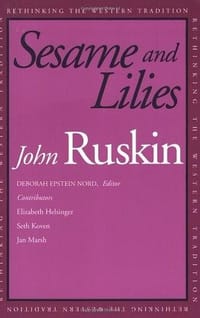John Ruskin's "Sesame and Lilies", first published in 1865, stands as a classic 19th-century statement on the natures and duties of men and women. Although widely popular in its time, the work in its entirety has been out of print since the early 20th century. This volume reunites the two halves of the work: "Of Kings' Treasuries", in which Ruskin critiques Victorian manhood, and "Of Queens' Gardens", in which he counsels women to take their places as the moral guides of men and urges the parents of girls to educate them to this end. Feminist critics of the 1960s and 1970s regarded "Of Queens' Gardens" as an exemplary expression of repressive Victorian ideas about femininity, and they paired it with John Stuart Mill's more progressive "Subjection of Women". This volume, by including the often ignored "Of Kings' Treasuries", offers readers full access to Ruskin's complex and sometimes contradictory views on men and women. The accompanying essays place "Sesame and Lilies" within historical debates on men, women, culture and the family. Elizabeth Helsinger examines the text as a meditation on the pleasures of reading; Seth Koven gives a wide-ranging account of how Victorians read "Sesame and Lilies"; and Jan Marsh situates the work within controversies over educational reform.

